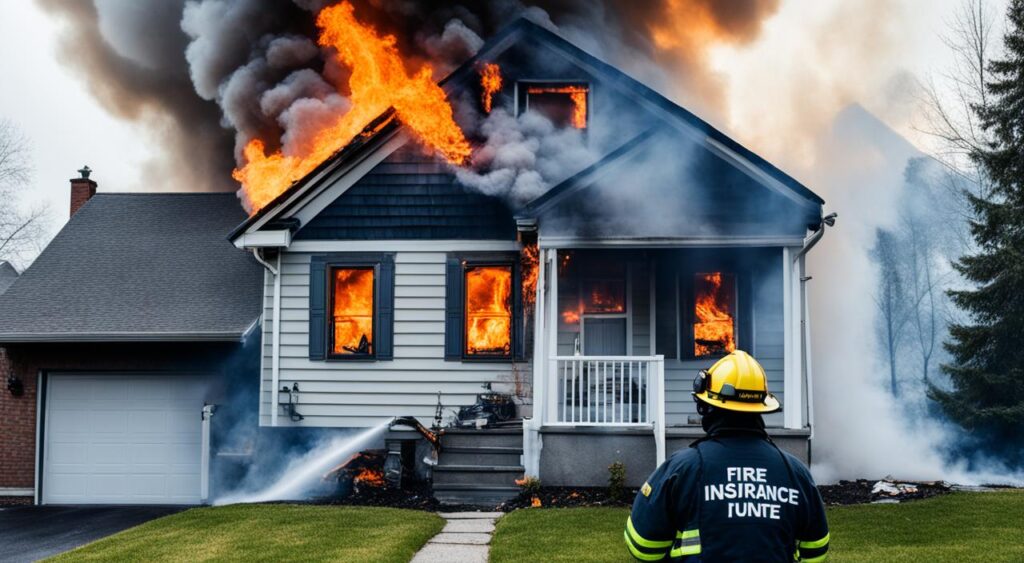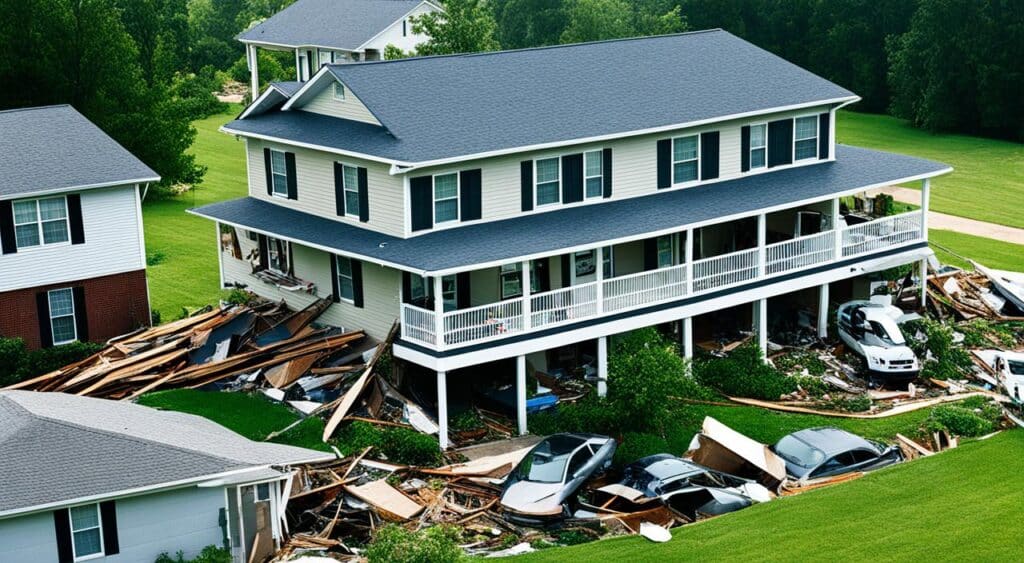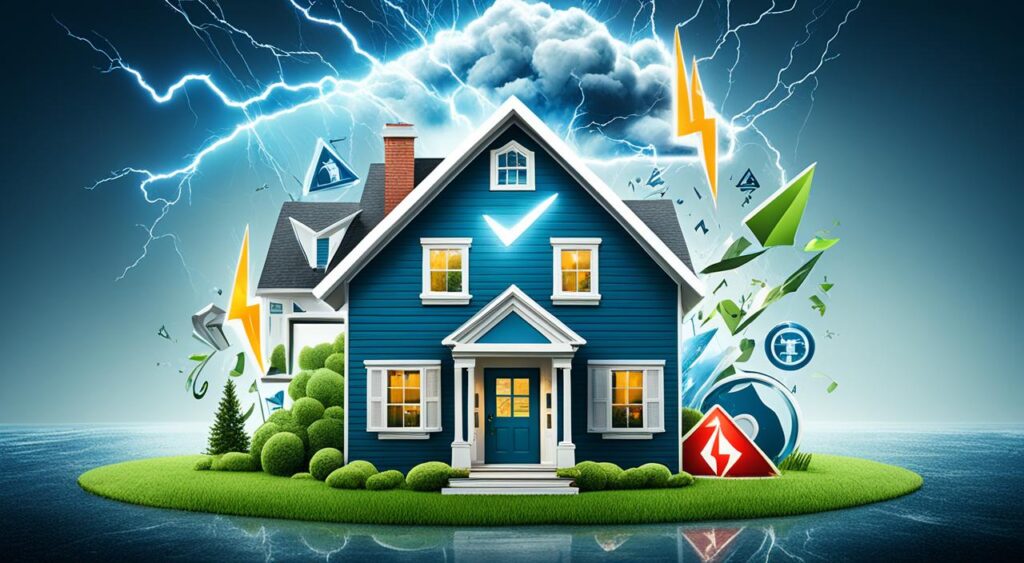Property insurance is key for homeowners and renters. It protects them from the big hits of natural disasters. The usual homeowners insurance (HO-3) helps with damage from fire, lightning, wind, hail, and more. But, it doesn’t cover everything. You might need extra policies for floods and earthquakes.
The main job of property insurance is to give financial security. This way, homeowners and renters can fix, build, or replace their homes and stuff after a disaster. It’s important to check what your policy includes and what it doesn’t. This makes sure you’re ready for dangers in your area.
Key Takeaways
- Property insurance helps protect homeowners and renters against damage to their homes, belongings, and liability from natural disasters.
- Standard homeowners insurance policies (HO-3) cover a wide range of perils, but do not automatically cover all natural disasters, such as floods and earthquakes.
- Separate insurance policies may be required for specific natural disaster coverage, such as flood insurance or earthquake insurance.
- Understanding the coverage and exclusions in a property insurance policy is crucial for ensuring adequate protection against natural disasters.
- The purpose of property insurance is to provide financial protection so homeowners and renters can repair, rebuild, or replace what has been lost or damaged in a disaster.
Understanding Property Insurance
Property insurance is key to safeguarding your home and belongings. There are many types of insurance with different coverage options to fit your needs.
Types of Property Insurance Policies
The HO-3 Special Form is common for homeowners. It covers your home, structures on your property, and personal items. This includes protection from fires, storms, and more. Yet, remember, floods and earthquakes need their own policies.
The HO-4 policy is for renters. It protects your belongings and against liability but not the actual space you live in. It’s made for those renting to keep their items and legal protection in case of a guest’s injury.
Also Read : What Are The Benefits And Drawbacks Of Using Communication Technology In Education?
Dwelling and Personal Property Coverage
A homeowners policy (HO-3) helps with home repairs, replacements, and personal items after damage. It’s essential for bouncing back from disasters. This insurance assists in home rebuilding and replacing lost items.
Also Read : How Can University Courses Online Help You Achieve Your Career Goals?
Perils Covered by Standard Policies
Standard HO-3 policies include fire, lightning, and some natural disasters. They safeguard against hail, explosions, and more. Knowing what your policy covers and excludes is vital for protecting your home and belongings.
Also Read : What Qualifications Are Required For State Government Jobs In The Usa?
| Policy Type | Dwelling Coverage | Personal Property Coverage | Liability Coverage |
|---|---|---|---|
| HO-3 Homeowners | ✓ | ✓ | ✓ |
| HO-4 Renters | – | ✓ | ✓ |
| Landlord Insurance | ✓ | – | ✓ |
Tornadoes and Property Insurance
Home insurance usually includes protection against tornado damage such as wind and hail. But, in areas where tornadoes happen more often, there might be extra deductibles for such incidents. These special deductibles are meant to lower the risk for insurers if a big storm hits.
Also Read : What Are The Future Trends In Biotechnology?
Wind and Hail Damage Coverage
Your standard home insurance covers you if a tornado damages your house. But, it’s crucial to know about any special deductibles and how much coverage you have. Remember, flood damage from tornadoes will need another insurance, flood insurance, to protect you.
Also Read : What Makes Life Insurance In The Usa Different From Other Countries?
Disaster Deductibles in Tornado-Prone Areas
If you live where tornadoes are common, check your insurance carefully. Make sure you’re fully covered for wind and hail damage. Repairing or rebuilding your home if it’s hit by a tornado can be very expensive. Having the right insurance is vital.
Hurricanes and Property Insurance
Homeowners insurance helps with damage from hurricanes, like wind and hail, in the home and to personal items. But, in areas often hit by hurricanes, you might have to buy “windstorm insurance” for more coverage on wind damage. Standard policies don’t cover flood harm, requiring a separate policy, often from the NFIP. Knowing what your insurance covers for hurricane damage is important, especially if you live by the coast.
Wind and Hail Damage Coverage
A typical homeowners policy (HO-3) includes damage from hurricane winds and hail. It pays for home repairs, personal items, and covers other damages. Make sure your policy fully covers your area’s risks and the value of your property.
Windstorm Insurance for Coastal Areas
In hurricane-prone coastal areas, a special windstorm insurance policy might be necessary. This extra insurance ensures full protection from heavy winds in a hurricane. If you live near the coast, check your insurance policies carefully and talk with your insurance agent about this needed coverage.
Flood Insurance for Hurricane-Related Flooding
Ordinary homeowners insurance doesn’t pay for flood damages, including those from hurricanes. To be covered, it’s advised to get a flood insurance policy, often from the National Flood Insurance Program (NFIP). This coverage is vital for your home, items, and living expenses in case you can’t stay in your house due to floods.
Fire and Property Insurance

A standard homeowners insurance policy (HO-3) normally covers fire damage to your dwelling and personal property. It pays to fix or rebuild your home. It also helps replace personal items like furniture and clothes if they’re damaged or lost.
Coverage for Dwelling and Personal Property
If a fire happens, your insurance kicks in. It helps pay for fixing your home’s structure, the dwelling coverage. It also covers lost or damaged personal property, such as your furniture and clothes.
Wildfire Exclusions in High-Risk Areas
But, some areas at risk of wildfires might not include fire coverage in the homeowners policy. You might need to buy extra wildfire insurance. It’s important to check your policy to understand what it covers. Especially if you live in a place that’s at high risk for wildfires.
Other Natural Disasters Covered by Property Insurance

Standard homeowners insurance policies protect homes from many natural disasters. These include explosions, civil commotion, and lightning strikes. They also cover volcanic eruptions and extreme cold and freezing conditions. If these events hurt your house or things, your HO-3 policy should help. Yet, coverage is limited by your policy’s terms.
But, some harms like from heavy snow may not be covered without a special add-on. It’s key to know what your policy includes and excludes. This knowledge is important for being fully insured against disasters.
Also read : Minimizing Risk, Maximizing Joy: The Benefits Of Wedding Insurance
Explosions and Civil Commotion
Damage from explosions is usually included. This can be caused by gas leaks or faulty appliances. Your policy may also cover damage from civil commotion, like riots. It can help with fixes or any legal claims related to these events.
Lightning Strikes
Lightning often comes with fire and power damage. Homeowners insurance policies normally cover this. It helps repair or replace electrical parts, appliances, or other personal items hit by lightning.
Volcanic Eruptions
In volcanic areas, damage from eruptions might be covered. This includes ash or lava destruction. Such coverage aids in fixing your property or replacing damaged items after a volcanic event.
Extreme Cold and Freezing
Burst pipes from the cold are usually covered. So are damages from ice on the roof. But, not everything is covered. It’s wise to check what your policy offers and what it doesn’t.
Property Insurance
Property insurance is key for homeowners and renters. It protects them from huge financial losses caused by natural disasters. Without it, things like tornadoes, hurricanes, and fires could lead to major money problems.
Comprehensive Coverage for Your Home and Belongings
Homeowners insurance (HO-3) covers building and personal items. It includes damage from fires, lightning, and wind. But be aware, things like floods or earthquakes need extra coverage. By knowing what your policy includes, you make sure your home and belongings are safe.
Navigating Natural Disaster Coverage
In areas prone to specific disasters, extra insurance might be needed. For things like tornadoes or hurricanes, consider special coverage. Working with your insurance company, you can get a policy that fits your area and needs. This ensures you’re ready for whatever comes your way.
FAQs
Q: What does property insurance cover against natural disasters?
A: Property insurance can help protect your home and personal belongings from damage caused by natural disasters such as fires, earthquakes, hurricanes, and floods.
Q: How does homeowners insurance differ from renters insurance?
A: Homeowners insurance typically covers both the structure of your home and your personal belongings, while renters insurance only covers your personal belongings within a rental property.
Q: How can I save on insurance premiums?
A: You can often qualify for insurance discounts by bundling your home and auto insurance, installing security features in your home, or maintaining a good claims history.
Q: What is liability coverage in property insurance?
A: Liability coverage in property insurance helps protect you financially if someone is injured on your property or if you cause damage to someone else’s property.
Q: Does homeowners insurance cover damage caused by floods?
A: Most standard homeowners insurance policies do not cover flood damage. You may need to purchase additional coverage through the National Flood Insurance Program.
Q: How do I get a home insurance quote?
A: You can get a home insurance quote by contacting insurance providers directly, using online insurance quote tools, or consulting with an insurance agent.
Q: Is rental property insurance different from homeowners insurance?
A: Yes, rental property insurance is specifically designed to protect properties that you rent out to others, whereas homeowners insurance covers the property where you reside.


